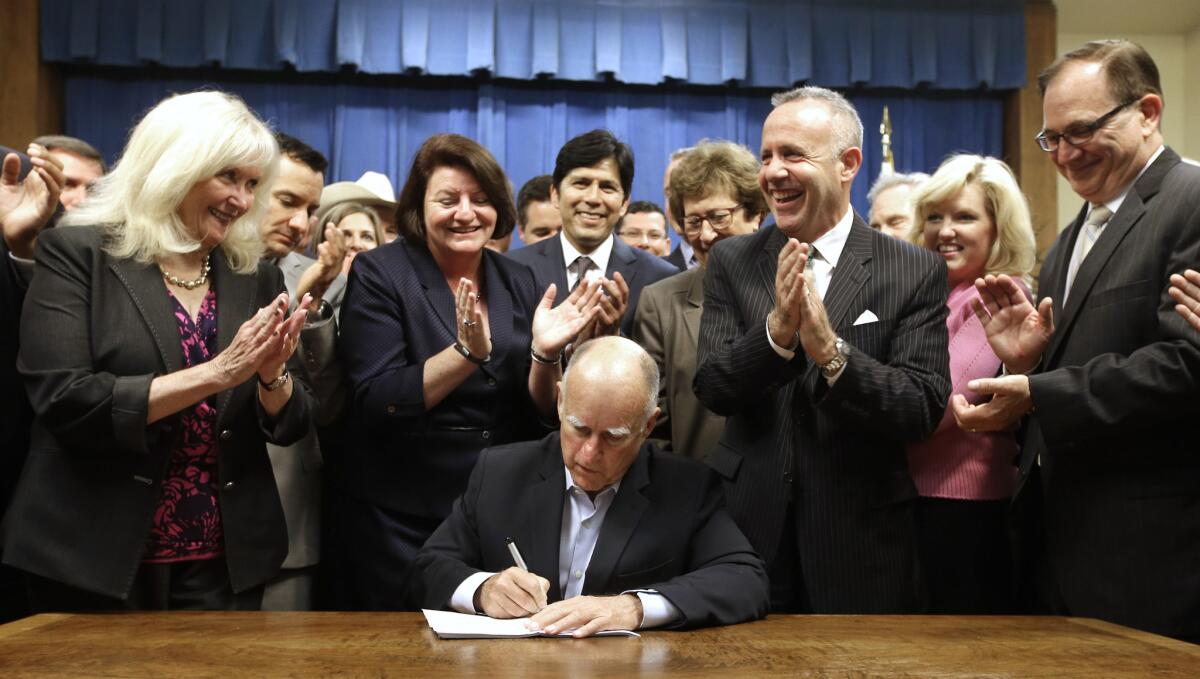The cup’s half full without groundwater regulation

They’re all patting themselves on the back in the state Capitol for finally achieving a water bond deal. And that’s fine. It was a momentous act.
But what really would be historic — and worth running self-congratulatory reelection ads about — would be to pair the bond proposal with even more important groundwater regulation.
As Senate water committee Chairwoman Fran Pavley (D-Agoura Hills), a leading advocate of groundwater regulation, says of California’s falling aquifers: “Just because they’re out of sight doesn’t mean they should be out of mind.”
But they always have been in California.
This is the only Western state that refuses to manage groundwater. It’s indefensible. Underground basins supply 40% of the water we use in an average year and nearly 65% during this drought.
But there’s a laissez-faire attitude that allows landowners to pump all they want — or can — from their plummeting wells.
Even Texas — that bastion of anti-regulation — recently began managing groundwater.
In California, over the past century, water tables have fallen by hundreds of feet in some areas, especially in the crop-rich San Joaquin Valley where land is sinking. In northern San Luis Obispo County, thirsty vineyards have quaffed down aquifers. Out in growing Lancaster, sometimes they have to drill 300 feet deeper for water than they did in the 1930s.
And, according to the California Water Foundation website: “There’s another threat that should be of concern to Southern Californians: earthquakes.
“Groundwater is heavy and depresses the earth’s upper crust like a weight. Remove that weight and the earth could spring upward. And that change in pressure can trigger more small earthquakes.”
How much convincing do the politicians need?
There are two identical groundwater regulation bills struggling to win passage as the Legislature enters the final two weeks of its two-year session. One, SB 1168, is by Pavley; the other, AB 1739, is by Assemblyman Roger Dickinson (D-Sacramento).
The legislation would empower local governments to manage groundwater to make it sustainable by 2040. And if any local entities failed, the state could step in and regulate.
The possibility of state bureaucrats clamping their hands onto well spigots worries farmers.
“We should require the counties to get their houses in order, but the state should not be coming in here and saying, ‘This is what you’re going to do,’” says Paul Wenger, president of the California Farm Bureau Federation, who grows 400 acres of almonds and walnuts near Modesto.
Wenger also thinks the legislation should focus only on the roughly 130 groundwater basins — out of a total 515 — that are in the worst trouble.
No problem, say the legislation’s advocates. “That indeed is our priority,” Pavley insists.
As for Sacramento seizing well pumps, gubernatorial spokesman Jim Evans asserts: “The goal is for the state to not have to step in at all. The goal is to provide locals the help to manage groundwater on their own.”
But the overarching goal is to stop the hemorrhaging of precious groundwater — to quit pumping out more than can seep back in. Preferably, the locals would do that. But if not, the state must.
“We keep building our economy in California on deficit-spending water,” says former state water director Lester Snow, who heads the private water foundation.
“It’s like having a bank account that everyone can write checks against, but nobody’s responsible for balancing or making sure deposits are made. And that’s exactly how we’re managing groundwater. One day it’s going to be depleted.”
Gov. Jerry Brown has been pushing for groundwater management, but it’s not clear how hard. His focus has been on passing the $7.5-billion bond proposal that will appear on the November ballot.
The bond would pair nicely with groundwater regulation. There’s $100 million in the borrowing proposal for planning and implementing groundwater management, which could be spent by local governments.
There’s also $800 million for cleaning up groundwater. And if we’re going to spend money on decontaminating it — removing toxicants like those polluting the San Fernando Valley aquifer — we should regulate the water’s use.
Same thing with $200 million earmarked for capturing storm water, $700 million for recycling and $2.7 billion for dam building. Those projects could help replenish underground basins. And a few pumping rules could assure taxpayers they’re getting their money’s worth.
With more groundwater available because of public largesse, it would almost be criminal negligence not to regulate it.
But agriculture lobbyists are working the Capitol halls fighting the groundwater legislation. There’s not enough time, they argue, to get the bill right. The politicians are moving too fast.
“The last two weeks of a session is a bad time to finish making the sausage,” says Dave Puglia, vice president of the Western Growers Assn. He’s alluding to the old maxim about laws being like sausages; watching them being made is not a pretty sight.
“There’d be bad consequences to getting it wrong,” Puglia says, adding that farmers fret about lost property values if they’re denied access to water under their lands.
Dickinson responds: “The consequences of continuing to overdraft our groundwater are too scary to contemplate.”
The farm lobby thinks the governor and the Legislature should hold off until next year. But Sacramento has been holding off on groundwater regulation since statehood, ignoring experts who increasingly have warned about California’s leaky water bucket.
The politicians should have acted half a century ago when Pat Brown was governor — or at least the last time son Jerry was.
The governor should lead everyone into a room and force a deal, as he did on the water bond. That would be huge and really justify back-slaps.
More to Read
Start your day right
Sign up for Essential California for news, features and recommendations from the L.A. Times and beyond in your inbox six days a week.
You may occasionally receive promotional content from the Los Angeles Times.







